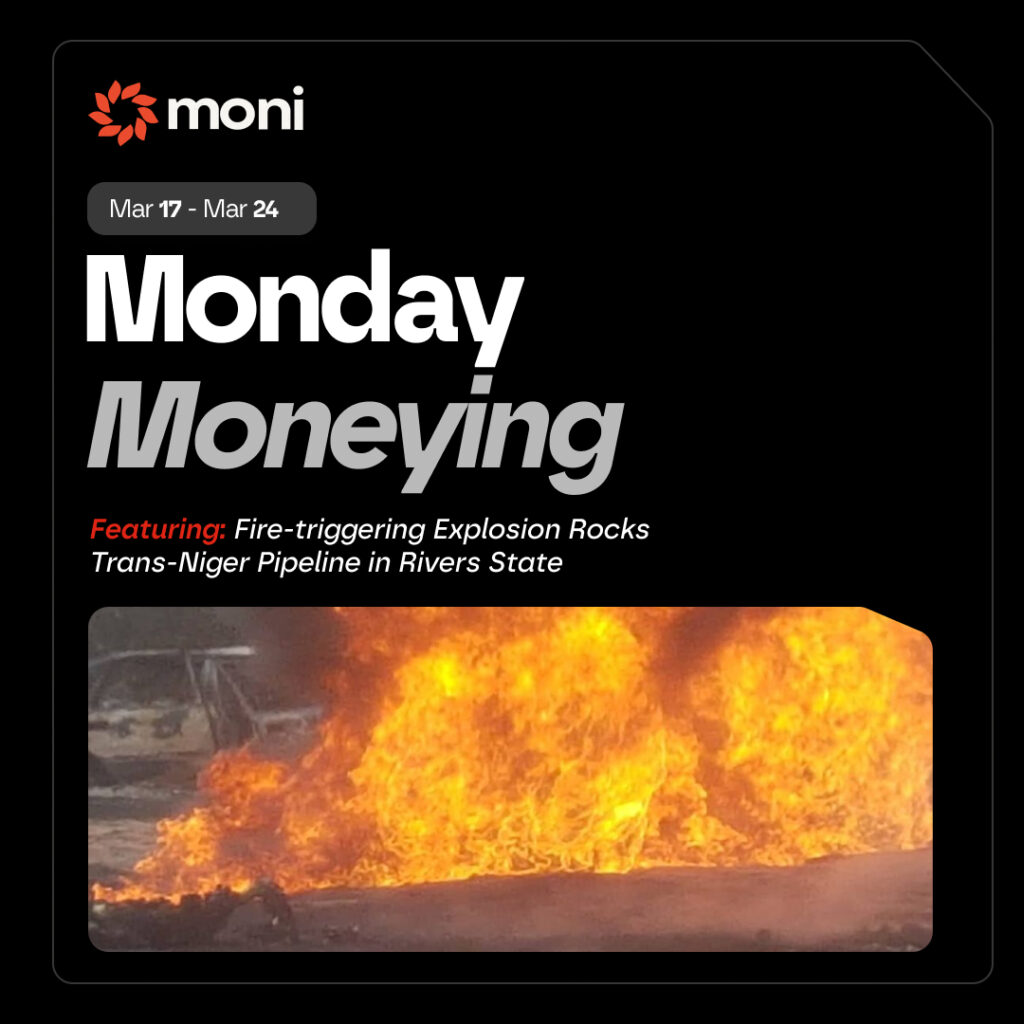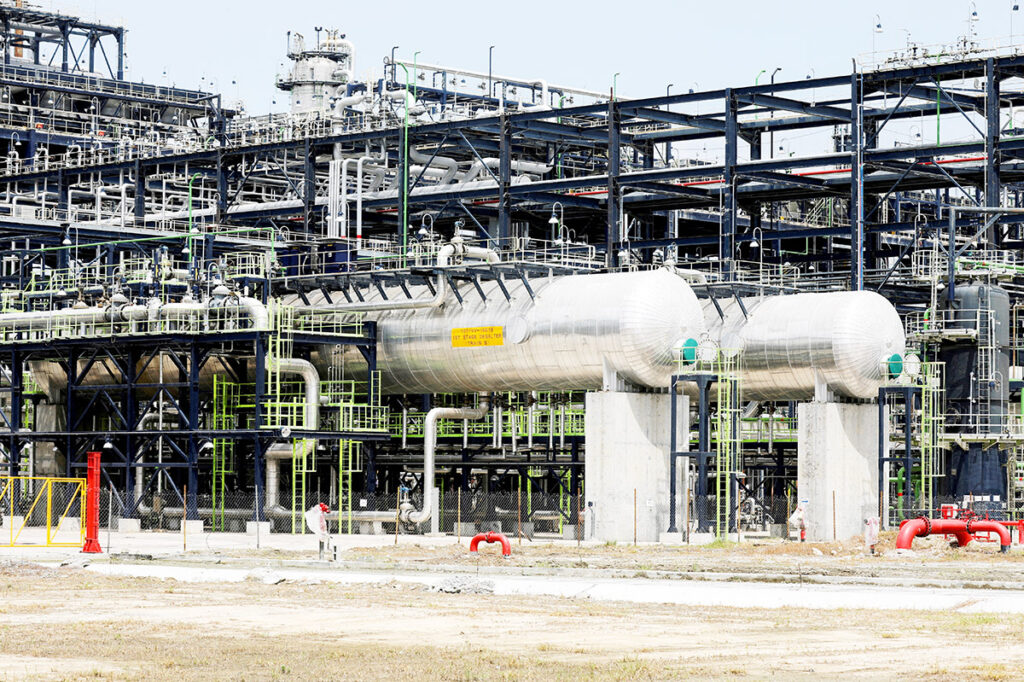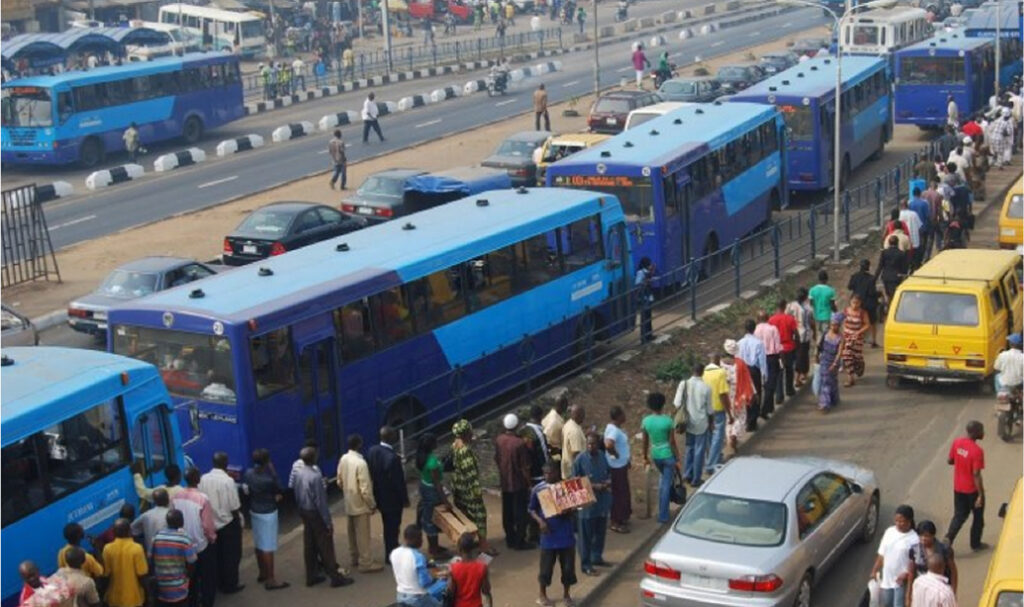Welcome to Monday Moneying, a rundown of the biggest financial stories shaping Nigeria, delivered straight to you every Monday Morning.

In this week’s episode…
Fire-triggering Explosion Rocks Trans-Niger Pipeline in Rivers State

The Rundown
A fire-triggering explosion hit Nigeria’s critical Trans-Niger Pipeline in Bodo, Rivers State, potentially disrupting crude oil exports to the Bonny Terminal. While investigations are ongoing, the incident comes amid heightened political tension and threats from militant groups — raising questions about sabotage and economic fallout.
The Details
- The explosion occurred Monday night at Bodo, Gokana LGA, along the Trans-Niger Pipeline (TNP) — a key route for crude oil exports.
- The cause remains unconfirmed, but there are concerns about possible sabotage, especially with militant threats tied to Rivers State’s political crisis.
- The TNP, now owned by Nigerian oil consortium Renaissance Group, has a capacity of 450,000 barrels per day.
- Tony Okonedo, Renaissance Group’s Spokesperson has stated that operations have resumed at The Trans-Niger Pipeline (TNP).
BOI Launches ₦10bn GLOW Fund to Empower Female Entrepreneurs

The Rundown
The Bank of Industry (BOI) has unveiled a ₦10 billion loan initiative called Project Guaranteed Loans for Women (GLOW) to support female entrepreneurs across Nigeria. The move aims to address the massive financing gap faced by women in business and promote inclusive economic growth.
The Details
- GLOW Fund will provide low-interest loans, mentorship, and capacity-building programs for women-led businesses.
- BOI’s MD, Dr. Olasupo Olusi, highlighted that 23 million Nigerian women entrepreneurs account for 41% of the country’s micro-businesses, yet many struggle with access to finance.
- The initiative is in partnership with WCCIMA, a key advocate for women’s economic empowerment.
- Nigeria’s financing gap for women-owned businesses exceeds $42 billion, signaling a major untapped growth opportunity.
Air Peace Cuts Nigeria-London Airfare by ₦600,000

The Rundown
Air Peace has slashed ticket prices on its Nigeria–London Gatwick route, offering travelers up to ₦600,000 in savings. The airline is also giving passengers one free extra luggage allowance as part of its latest promo, which runs until March 31, with travel valid through April 15.
The Details
- Promo fares start from ₦965,500 to ₦975,500 for economy class, and ₦2.38 million for business class.
- Travelers from Abuja, Asaba, Benin, Enugu, Owerri, Warri, Port Harcourt, and Umueri will connect through Lagos before flying to London.
- Air Peace launched the Lagos–London route in March 2024, initially disrupting the market with fares starting at ₦1.2 million for economy — much lower than the ₦3–₦5 million charged by foreign airlines.
- The price cut follows an intense price war, with foreign airlines slashing rates to compete with Air Peace’s growing popularity.
Dangote Refinery Halts Sale of Petroleum Products in Naira

The Rundown
The Dangote Petroleum Refinery has temporarily suspended the sale of petrol in Naira, citing a mismatch between Naira proceeds and its crude oil purchase obligations in U.S. dollars. The company says it will resume local currency sales once it receives Naira-denominated crude allocations from NNPC.
The Details
- The move comes after the refinery’s Naira sales outpaced the amount of Naira-priced crude it received.
- This decision follows the federal government’s October 2024 naira-for-crude policy, which the NNPC has now clarified as non-binding going forward.
- Consumers have recently seen PMS prices drop to ₦865–₦950 per litre in Awka, partly due to a pricing war between NNPC and Dangote Refinery.
- On February 27, Dangote Refinery slashed its ex-depot petrol price from ₦890 to ₦825/litre, intensifying market competition.
- The Independent Petroleum Marketers Association of Nigeria (IPMAN) warns that ongoing fluctuations are hurting smaller marketers, who may now have to source fuel via bigger industry players.
- Dangote Refinery says reports of loading disruptions due to ticketing fraud are false and assures its systems remain secure and robust. The refinery remains committed to serving the local market sustainably and will resume Naira sales as soon as NNPC allocates more Naira-priced crude cargoes.
Court Dismisses FCCPC’s Bid to Join Dangote Refinery’s ₦100bn Import License Suit

The Rundown
The Federal High Court in Abuja has dismissed the FCCPC’s application to join the ongoing ₦100 billion import license suit filed by Dangote Petroleum Refinery and Petrochemicals. The court said FCCPC had no legal ground to be involved in a case tied to the Petroleum Industry Act (PIA).
The Backstory
- Dangote Refinery is in court to nullify import licenses granted by the Nigerian Midstream and Downstream Petroleum Regulatory Authority (NMDPRA) to several oil companies, including NNPCL, Matrix, A.A. Rano, and others.
- Dangote argues that these licenses contradict the PIA, which only permits imports when local production can’t meet demand.
Why FCCPC Tried to Join
FCCPC claimed it had a stake in the suit because it concerns potential monopoly and anti-competitive practices in the oil sector. It said barring others from importing petroleum products could give Dangote a monopoly.
But the Court Said No
Justice Inyang Ekwo dismissed the request, stating that the FCCPC wasn’t a relevant party to a matter focused on petroleum import licenses under the PIA. He called the application “unmeritorious” and ruled that the case can proceed without the Commission’s involvement.
FYI:
- The court had earlier dismissed a preliminary objection by NNPCL, and the next hearing is set for May 6, 2025.
- Dangote previously accused rival importers of flooding the market with substandard fuel and has been in regulatory clashes over control of Nigeria’s fuel supply chain.
- Meanwhile, the FG has permitted marketers to buy directly from the refinery, bypassing NNPCL.
FG, States & LGAs Shared Record ₦15.26 Trillion in 2024 — NEITI

The Rundown
The Nigeria Extractive Industries Transparency Initiative (NEITI) says the Federation Accounts Allocation Committee (FAAC) disbursed a whopping ₦15.26 trillion to the federal, state, and local governments in 2024 — the highest ever recorded.
The Details
- This marks a 43% jump from previous years.
- Key drivers? Fuel subsidy removal and FX reforms, which boosted oil revenue inflows.
- Disbursement breakdown:
- FG: ₦4.95 trillion (+24% from 2023)
- States: ₦5.81 trillion (+62%)
- Local Governments: ₦3.77 trillion (+47%)
State-by-State Snapshot
- Top Allocations: Lagos (₦531.1bn), Delta (₦450.4bn), Rivers (₦349.9bn)
- Lowest Allocations: Nasarawa (₦108.3bn), Ebonyi (₦110bn), Ekiti (₦111.9bn)
- Debt Deductions: ₦800 billion deducted from state allocations for foreign debt servicing and other obligations. Lagos had the highest deduction (₦164.7bn).
NEITI’s boss, Dr. Orji Ogbonnaya Orji, called for smarter fiscal planning and more accountability in managing public funds — especially as inflation, debt servicing, and oil dependence pose long-term risks. He also stressed the need for sustainable economic reforms to ensure job creation, poverty reduction, and economic resilience.
Lagos Forfeits ₦500m Monthly to Sustain 25% Transport Fare Slash

The Rundown
The Lagos State Government gave up ₦500 million monthly revenue to keep its 25% public transport fare reduction going, offering relief to millions of residents hit by rising costs of living.
The Details
- The initiative covers BRT, BRI, Metro Rail, and Water Transport, reducing daily commuting costs across the state.
- A total of 18.54 million commuters benefitted from the fare cut in 2024:
- BRT/BRI: 16.84 million passengers
- Metro rail and ferries: 708,427 passengers
- The data was released in the Lagos Economic Development Update (LEDU) 2025, published by the Economic Intelligence Department of the Ministry of Economic Planning and Budget.
- The fare subsidy was coordinated by the Lagos Metropolitan Area Transport Authority (LAMATA) as part of wider economic relief programs.
This social intervention is part of Lagos State’s broader efforts to soften the impact of inflation, fuel subsidy removal, and economic reforms. It’s also one of the key measures that helped reduce transport and food cost pressures for residents.



